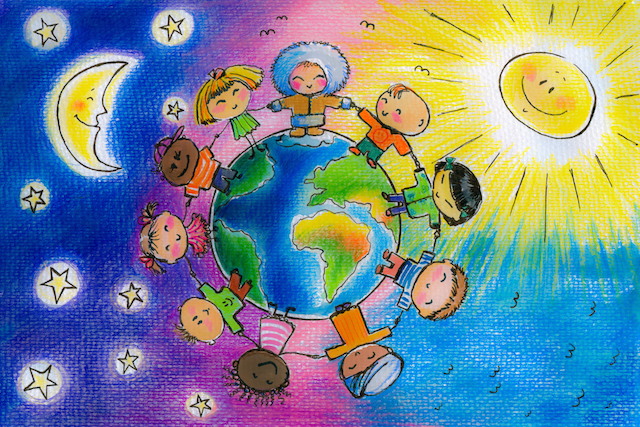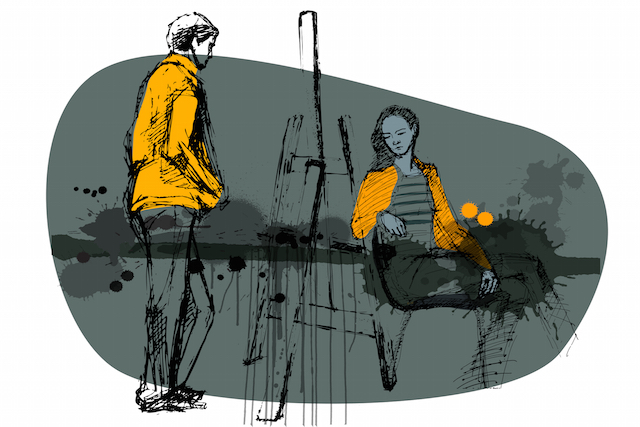
“Raise your words, not your voice. It is rain that grows flowers, not thunder.” ~Rumi
One of the most common sources of conflict among people is in the way we communicate. Often times, conflicts arise because of the variety of our opinions and beliefs, and also from the way we express our thoughts and communicate disagreement.
A blaming, sometimes even aggressive tone of voice can seep into our language, which invites confrontation instead of collaboration, and conveys a closed “my way or no way” kind of approach.
Looking back on my past, I can recall myself during my childhood years, when anything felt possible. In my world, full of playfulness, creativity, and fun, things were straightforward and clear. Whenever I was hungry, I made sure my mother knew about that. When I was afraid, sad, or upset, I said so. Whenever I wanted anything, I asked for it.
In this open communication space, there was no room for mind reading or making assumptions. I didn’t claim to know what other people felt or thought. If anything was unclear, I asked. I didn’t let my mind play with me and create scenarios about what other people had in their minds or hearts, because I knew I wasn’t them. Life was quite simple, and the older I got, the stronger my need to complicate it became.
Taking an honest look at my life as a grown-up woman, I came to realize I was often aggressive with people, without even being aware of it. I never screamed and yelled at people, but I expressed my thoughts and emotions aggressively, especially when I was trying to convey opinions I strongly believed in and get my voice heard.
That is an area I am still working on. However, I have spent a while reading about the field of non-violent communication, learning how to communicate with clarity and confidence in any situation and, by that, avoid unnecessary drama or confrontation.
A few years ago, I started to apply this learning in my everyday life. Surprisingly, I could see how small adjustments in my communication helped me to improve my relationships with people in my personal life and career.
Here are four useful suggestions that helped me refine my communication skills and build bridges of mutual understanding with others.
1. Be curious about others’ intentions.
Conflict often arises because we tend to evaluate our actions based on our intentions, yet judge others based on their actions.
For instance, when I fear I might have offended someone with my words, my immediate reaction would be to explain myself and make it clear my real intention was not to hurt anyone: ”I’m sorry, I didn’t mean to sound like that. My point is that…”
However, when I didn’t like what I heard in a sensitive conversation, I would jump immediately into a defensive or even aggressive posture, without even trying to understand more about what others wanted to tell me.
As a solution, I learned how to ask questions with the genuine curiosity of a child, as if I knew nothing. I want to know more about the story behind the words: the circumstances, the impact on the people involved, their intentions, and so on.
Here are some of my favorite questions that help me do that:
- How did this happen?
- Can you tell me more about it?
- What can we do to sort this out?
The way we formulate our questions is also essential, so stop asking “why?”
Let me ask you one the same question, in two different ways. Say I’m disturbed by your words. I could choose to either reply with, “Why are you saying that?” or I could ask, ”What makes you say that?”
Can you feel the difference between the two questions? Don’t you feel like the “why” question sounds more accusatory than the other?
When asked “why,” people tend to feel blamed. As a consequence, they either shut up entirely or go into a defensive mode, trying to justify themselves. Meanwhile, the “what” questions invite an open discussion and transparent communication. They help bring more balance, harmony, and peace during sensitive conversations.
In reality, we only judge what we don’t understand, so I make sure I stay away from confusion. People can only be responsible for what they say, not for what I understand. And no one is a mind reader.
“Don’t make assumptions. Find the courage to ask questions and to express what you really want. Communicate with others as clearly as you can to avoid misunderstandings, sadness, and drama.” ~Don Miguel Ruiz
2. Practice the art of listening.
I will be brutally honest with this one: In the past, I used to be very self-absorbed and eager to take space in conversations. I used to listen in order to know what to say next instead of being fully present for others with mind, body, and soul, so that I could understand their perspectives and points of view. I tended to interrupt others in the attempt of explaining or defending myself. In other words, conversations were generally a lot about me, not so much about others.
Sometimes, the only thing we have to do in a situation that might look like a conflict or disagreement is to hear what other people have to say with genuine care, curiosity, compassion, and attention.
In my case, I had to learn how to listen actively. During conversations, I imagined myself having a zipper on my mouth, closing that zipper while people were talking, and allowing myself open the zipper only once they finished. This simple exercise helped me to get present and focused on the other person, both in my personal life and career.
In a world where most people love to talk about themselves, being able to listen to another person is a form of love.
“Most people don’t listen with the intent to understand; they listen with the intent to reply.” ~Steven R.Covey
3. Express your wants and needs assertively.
One of the most transformational days of my life was the day I found out I was underpaid. I turned into a volcano of anger and blame and ended up in a severe conflict with my manager at the time.
The moment I stopped acting like a victim (How could they do this to me? How could this ever happen?) and took charge of the painful situation I was in, everything shifted. I realized that during fourteen years spent in the corporate world, I had never negotiated a salary or asked for a raise. I used to be a perfectionist and an overachiever, often working overtime and weekends and expecting my managers to finally compensate me for my hard work and efforts.
I never dared to express my wants regarding pay assertively, as if that was some kind of taboo or embarrassing topic one couldn’t talk about. The truth is that sometimes in life, we don’t get what we want just because we don’t dare asking for it.
So what is assertive communication?
Assertiveness is an attitude of confidence and respect, expressed through a combination of words (I think, I believe, I want), voice (steady and clear), and body language (upright stance). Assertive people are more able to deal with conflicts and to get to a “win-win solution,” they are better problem solvers and are less likely to get stressed.
Passive communication comes with putting others needs ahead of our own. Allowing people to make fun of us, putting ourselves down or making ourselves small so others can feel good about themselves, could be one example.
Aggressive communication would impose our thoughts or wishes on others (you should, you must, you better do that, how can you think like this).
Assertiveness is an open and direct expression of our thoughts and feelings while respecting the right of others to express themselves. It is a form of being kind to ourselves as well as to the other person.
4. Be open to different points of view.
I once had an interesting conversation with a friend about one of my favorite topics: life. At the time, I was convinced there was a predefined path for us humans, a destiny one could never change. Meanwhile, my friend had a very different view on her life: “I can create my future every single day,” she said. “If there’s some kind of destiny I dislike, I can surely change it.”
I found that unacceptable. Who did she think she was? I didn’t speak to her for weeks.
I acted in the same way years later, during the presidential elections in my home country, Romania, when a close friend decided to vote for the candidate I disliked. I can recall how angry I was. I thought she was smart, so how could she?
This aggressive way to relate to people was a toxic behavior I’m not proud of. However, I don’t get into the trap of the guilt, shame, and self-blame any longer. Today, I know that was the best I knew and the best I could, with the instruments of awareness I had at the time.
And here’s what I know to be true today:
When we come to this world, we know nothing. We are all products of the societies and cultures that raised us (family, school, religious, or political systems). Since societies and cultures are different, it is expected to encounter a variety of individual values or systems of belief.
As described by Descartes, humans are “social animals,” and we all have a basic need to belong to a community. We tend to feel more at ease when surrounded by like-minded people. Whenever I am having a conversation with someone whose opinions differ from mine, I try not to take things personally. Today I know I can always agree to disagree.
People also have the right to change their mind. As we grow and evolve, mindsets and perspectives on life can change, as well. Take my example: years ago, the Old Me was blaming that dear friend for saying she could create her own path in life. The New Me thinks the same: I believe everything in life is a matter of personal choice, and we are the sum of our decisions. Interesting how a belief that once disturbed me a lot can feel so resonant today.
I refuse to think we live in the world where fear, hate, anger, and separation are part of a new, modern Era. I think Mother Earth needs more of our loving energy to heal: more heart, understanding, less judging and more compassion, less taking and more giving, less competition and more collaboration and care.
Diversity is necessary for thought exchange and ultimate growth. Respecting our differences is a sign of self-care, and a way to make the world a much better place. Souls don’t hold a passport. Those have been assigned to us at birth. Hurting you is hurting myself. Loving you is loving myself. In spirit, we are all one.
“If you judge people, you have no time to love them.” ~Mother Teresa
And now, I would like to hear from you. How do you handle difficult conversations, stay away from confrontation, and create harmonious relationships with people?

Sara Fabian is a women’s career and empowerment coach and inspirational speaker, on a mission to help professional women to discover their unique strengths, gifts and talents, boost their confidence, find their calling and live a meaningful life of purpose. For weekly inspiration, subscribe to her free newsletter at sarafabiancoaching.com or follow her on Facebook.
Get in the conversation! Click here to leave a comment on the site.
The post How We Can Stop Arguing and Start Understanding Each Other appeared first on Tiny Buddha.
from
https://tinybuddha.com/blog/how-we-can-stop-arguing-and-start-understanding-each-other/
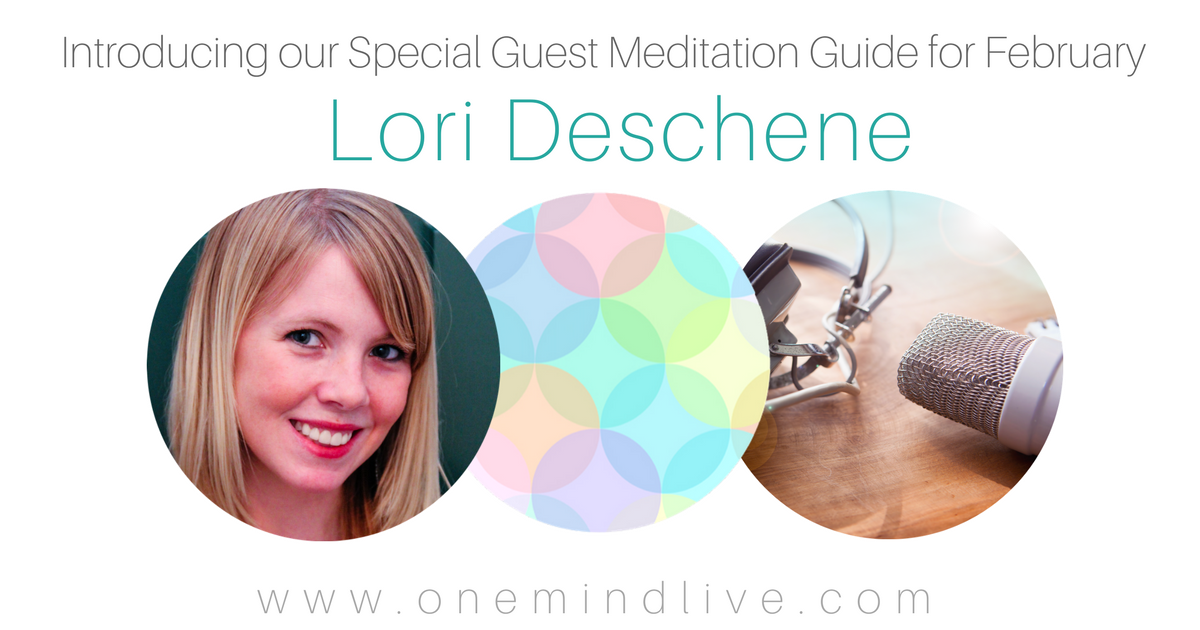
![]()










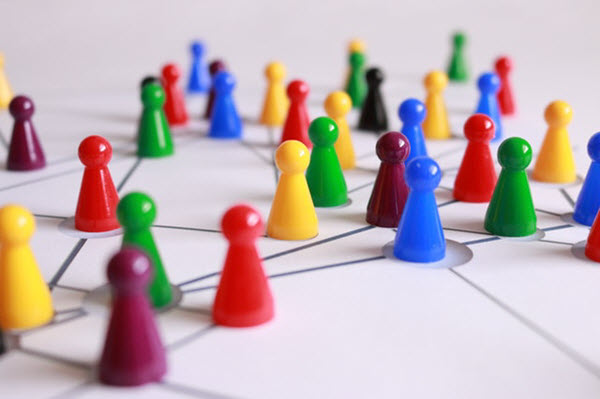
 Millennials have gotten a bad rap as lazy, entitled, and under-ambitious workers. In reality, however, most of them are just interested in finding a better way to do things. They like utilizing the latest technology and processes to make their efforts more efficient. In fact,
Millennials have gotten a bad rap as lazy, entitled, and under-ambitious workers. In reality, however, most of them are just interested in finding a better way to do things. They like utilizing the latest technology and processes to make their efforts more efficient. In fact,  Company culture is a huge deal to millennials. The majority of them are even willing to take a $7,600 pay cut for a job with a better workplace environment. While running a remote workplace makes it difficult to achieve that, it is still quite possible. Prioritize in-person meetings as often as possible, along with phone calls and Skype meetings, to create a more concrete connection between team members. Celebrate milestones or accomplishments by acknowledging these things during virtual meetings. Encourage each team member to participate in large meetings and share their inputs and suggestions. Millennials need to feel connected with their co-workers and business, so focus on creating a culture that they can participate in and enjoy.
Company culture is a huge deal to millennials. The majority of them are even willing to take a $7,600 pay cut for a job with a better workplace environment. While running a remote workplace makes it difficult to achieve that, it is still quite possible. Prioritize in-person meetings as often as possible, along with phone calls and Skype meetings, to create a more concrete connection between team members. Celebrate milestones or accomplishments by acknowledging these things during virtual meetings. Encourage each team member to participate in large meetings and share their inputs and suggestions. Millennials need to feel connected with their co-workers and business, so focus on creating a culture that they can participate in and enjoy. Before you actually become a skilled worker in Canada, you need to fit the following requirements:
Before you actually become a skilled worker in Canada, you need to fit the following requirements: For skilled workers, Canada indeed has many opportunities. However, there are specific guidelines which you must adhere to for a successful immigration process. Hopefully, this article helped you understand a bit about the immigration process and how you can get started.
For skilled workers, Canada indeed has many opportunities. However, there are specific guidelines which you must adhere to for a successful immigration process. Hopefully, this article helped you understand a bit about the immigration process and how you can get started.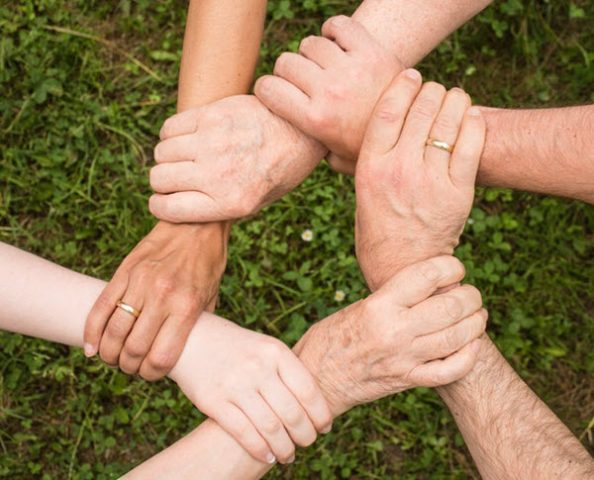 “You are what you eat.” You’ve probably heard this saying before. In the context of professional productivity, it carries a great weight. How? Replace “what you eat” with “who you hang out with.” When you
“You are what you eat.” You’ve probably heard this saying before. In the context of professional productivity, it carries a great weight. How? Replace “what you eat” with “who you hang out with.” When you  Your network of like-minded people won’t only help you meet your goals, but they can also help you make them. If you’re wondering if you should take a new job or make another career move, your peers will be able to offer some advice. Since they work in the same industry as you do, they’ve probably encountered a similar situation already. And if not, they, at least, have a better understanding of the job than you do.
Your network of like-minded people won’t only help you meet your goals, but they can also help you make them. If you’re wondering if you should take a new job or make another career move, your peers will be able to offer some advice. Since they work in the same industry as you do, they’ve probably encountered a similar situation already. And if not, they, at least, have a better understanding of the job than you do. Have you ever watched Nascar or Formula One? If so, then you probably noticed that these high-performance vehicles are forced to stop several times over the course of a race to refuel and replace their wheels. Those cars are some of the most finely tuned, high-performing feats of modern engineering our world has ever seen. Yet, they are forced to stop dozens of times over the course of a race to refuel! This is obvious to most people, but when applied to life, most people would think, “Bah, I can sleep when I’m dead. Life’s for the living baby!” If that’s your attitude, then I want you to listen carefully to what I’m about to say. If you want to perform really well, then you need to get serious about refueling yourself. Just ask any bodybuilder you know. Unless they are hopped up on steroids, they will tell you that proper nutrition, high-quality sleep, and the right supplements are just as important (if not more so) than lifting heavy weights. So, how can you apply the “secret” of refueling to your life? It’s actually pretty simple. Focus on the “Three P’s” of high-performance refueling. Physical, psychological, and personal.
Have you ever watched Nascar or Formula One? If so, then you probably noticed that these high-performance vehicles are forced to stop several times over the course of a race to refuel and replace their wheels. Those cars are some of the most finely tuned, high-performing feats of modern engineering our world has ever seen. Yet, they are forced to stop dozens of times over the course of a race to refuel! This is obvious to most people, but when applied to life, most people would think, “Bah, I can sleep when I’m dead. Life’s for the living baby!” If that’s your attitude, then I want you to listen carefully to what I’m about to say. If you want to perform really well, then you need to get serious about refueling yourself. Just ask any bodybuilder you know. Unless they are hopped up on steroids, they will tell you that proper nutrition, high-quality sleep, and the right supplements are just as important (if not more so) than lifting heavy weights. So, how can you apply the “secret” of refueling to your life? It’s actually pretty simple. Focus on the “Three P’s” of high-performance refueling. Physical, psychological, and personal. Sleep deprivation can kill you. If you want to perform at the highest level, then you must take your sleep seriously. Here’s a checklist to help you get better sleep tonight.
Sleep deprivation can kill you. If you want to perform at the highest level, then you must take your sleep seriously. Here’s a checklist to help you get better sleep tonight.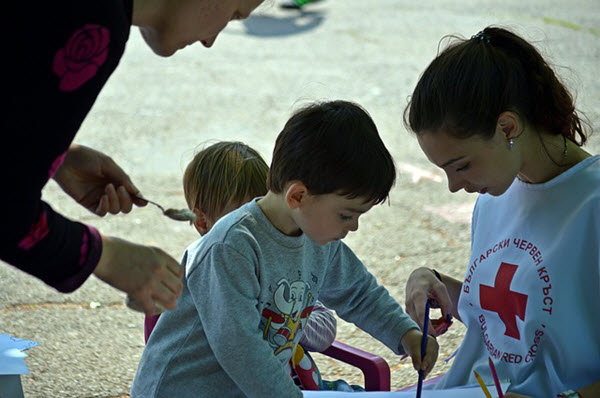 The final way to recharge yourself spiritually is to spend time every month in service to others. Go volunteer at a local soup kitchen, clean up the trails near your home or sign up to build a house with Habitat for Humanity.
The final way to recharge yourself spiritually is to spend time every month in service to others. Go volunteer at a local soup kitchen, clean up the trails near your home or sign up to build a house with Habitat for Humanity.





